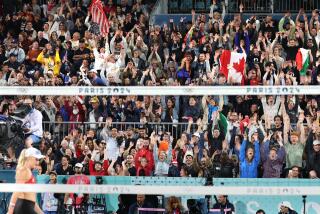Goal! Goal! Goal! France Hopes to Score Big With World Cup
- Share via
SAINT-DENIS, France — Starting today, a large part of the human race will keenly envy Alain Daibisaram. It took two years of planning, the help of trusted friends and the wits to outmaneuver a crippling airline strike, but he did it.
The 38-year-old industrial draftsman from the Caribbean island of Guadeloupe may be $1,440 poorer, but he is in France for the World Cup, with tickets in hand for three of the 64 games that will decide the international championship of soccer.
“My only regret is that I can’t get into the final,” said Daibisaram as he gazed admiringly at the brand-new, 80,000-seat stadium in this blighted Paris suburb where the tournament’s first and last games will be played. “I’d go bankrupt to get tickets for that.”
In what will be the 20th century’s last mega-mix of international sports and commercialism, teams from 32 nations, including the United States, will do battle over the next 33 days to decide who is the best at the world’s most played and most popular game.
Play begins here today with a match between four-time World Cup victor and defending champion Brazil and Scotland. Over the next five weeks, a global, cumulative and mostly male audience of 37 billion is expected to tune in.
The U.S. squad, now training in the fabled Beaujolais wine country north of Lyon, opens play next Monday in Paris against European champion Germany.
When the title match occurs July 12 at the gleaming, oval-shaped Stade de France in Saint-Denis north of Paris, an estimated 2 billion people--about three times the 750 million who saw the 1996 Super Bowl, the most watched U.S. football game ever--will be plunked in front of television screens from Terre Haute, Ind., to Tierra del Fuego, Argentina.
For France, a famously proud nation that snagged the rights to host the 16th World Cup, the first since the edition in Los Angeles four years ago, the planetary sports happening also known as the Mondial is a valued chance to showcase its organizational flair, high-tech prowess and state-of-the-art infrastructure.
Cup frenzy kicked off Tuesday evening in Paris with the Fete du Football, a street festival whose highlight was a quartet of 65-foot, plastic-skinned robot soccer players who stalked through the streets with their puppet-master operators concealed inside.
On Monday, President Jacques Chirac observed of the Cup’s import: “A France loyal to its sporting tradition and its sense of hospitality will take it to heart to illustrate and affirm the values that are those of sports: solidarity, involvement, respect of others.”
But not everyone is in a festive mood, and visitors and TV viewers alike will glimpse signs of social unrest and economic pessimism that contrast starkly with the bouncy cheer of the Cup.
Most visible is the strike by Air France pilots, the best paid in Europe. That job action is now in its second week. With a salary and benefits dispute grounding 75% of the planes at the World Cup’s “official airline,” travel plans for some of the estimated 500,000 foreign visitors to France have been thrown into disarray.
“We can all shout at the boss, but when it comes to transport strikes, you can’t take the country hostage,” complained Michel Platini, a former French soccer star and co-president of the World Cup Organizing Committee.
Meanwhile, in the western city of Nantes, where Spain and Nigeria open tournament play Saturday, disgruntled bus drivers are threatening to walk off the job unless they get a $300 bonus for the extra work caused by the World Cup. Hospital interns have also announced plans for a strike.
Chirac’s evocation of the “respect of others” also may ring hollow for non-French fans unable to get one of the 2.5 million tickets put on sale for the World Cup games. Two-thirds of the prized tickets, it turns out, were available only for those with a French bank account and a French address.
“The French have kept the tickets for themselves,” grumbled Bill Duguid, 43, a land assessor from Aberdeen, Scotland, who, clad in a kilt, came to France anyway to be around for the game against Brazil. “Ninety percent of the Scottish supporters don’t have tickets. We’re just here to party.”
Daibisaram said Paris-based friends at France Telecom, the national telephone company, got him his tickets, and another three for Edmond Machayam, a 28-year-old mason who accompanied him from Guadeloupe, a French island territory. By hopscotching across the Caribbean, they were able to avoid being grounded by the Air France strike.
“This is a big dream,” said Daibisaram as he walked with his friend around the broad esplanade on which the Stade de France stands. “We’ve been preparing this for two years.”
Incensed at how World Cup tickets were parceled out, one London-based tabloid called on English fans to give the French “a good kicking in their Gallic derrieres.”
Tournament organizers calmly reply that their sales plan was approved by world soccer’s governing body.
Besides, organizers point out, the national government in Paris, French cities and regions and publicly owned corporations like French railways shelled out $900 million of the $1.6 billion in World Cup organizational costs.
“Who has paid for all this? The French taxpayer,” Laurent Chertit, an official on the French Organizing Committee, told a European business newspaper. “That the French should get more tickets is perfectly understandable.”
About half of the money went to build Stade de France, an arena that still does not have a permanent sports tenant to serve as an anchor attraction once the tournament is over, and to renovate or rebuild stadiums in the nine other cities.
French authorities--up to and including Chirac--have repeatedly said security will be their prime concern in coming weeks. To prevent fan violence or a terrorist attack, more than 25,000 police, soldiers and firefighters will be on duty each day of World Cup play.
On Monday, 48 hours before the first whistle of Brazil versus Scotland, police in Paris and selected cities in the French provinces detained nine people suspected of having ties to Islamic fundamentalism. Last month, similar sweeps in France, Germany, Belgium, Italy and Switzerland resulted in 56 people being detained.
“Security will be present at the World Cup,” Interior Minister Jean-Pierre Chevenement promised.
Jittery over possible rampages inside or outside stadiums by unruly fans, the French have also assigned undercover agents to follow some of the most notorious troublemakers from Britain, the Netherlands, Italy and other countries.
The French will be aided by police from the hooligans’ home countries; these officers are being posted here during the tournament. Magistrates are also being assigned to stadiums on game day so they can mete out swift justice.
Paris is the world’s most popular vacation destination, so the economic effect of the World Cup seems likely to be a wash. Hotel bookings are even down about 5%, trade sources say, with many non-soccer fans avoiding the City of Light until the World Cup is over.
For months, posters and billboards have been reminding the French that they will be “hosting the world.”
In Paris, 20,000 shopkeepers, taxi drivers and other tradespeople have signed a pledge to deal with tourists in a fair, friendly manner.
But one French consumer magazine has found the Cup is also being used as an excuse to gouge customers. Hotel prices in the 10 cities where games will be played have zoomed by 41% on average, the magazine said, and by 58% in Saint-Denis.
Coca-Cola, Gillette, McDonald’s, Snickers and Mastercard are among 12 of the event’s biggest sponsors, an honor said to cost $30 million and more. Budweiser, the American brewer, is one of the dozen but had to change its promotional strategy when it found that French law does not allow the advertising of alcoholic beverages inside sports grounds. Bud sold the space to Casio, a Japanese electronics company.
As for Chirac and the games, he predicted that the World Cup will show “the dynamism and modernity of a France that is going forward.” His dream, he revealed, is to award the trophy to his country’s team, and millions here will be watching with the fervent hope that the French will win their first World Cup title.
But in this highly individualistic land, nothing is unanimous.
There are already at least three groups calling on the French to ignore the tournament and surrounding hoopla. Interested in what France’s “soccer widows” will do over the next five weeks, Elle, a glossy fashion magazine, conducted a poll and found that 55% of French women interviewed said they will spend time with girlfriends, while 21% said they are ready to go see a male stripper and 3% to take a lover.
* WORLD GAME: Brazil-Scotland kicks off the World Cup. C1
* AMERICAN GAME: Will soccer ever make it in this country? C1
More to Read
Go beyond the scoreboard
Get the latest on L.A.'s teams in the daily Sports Report newsletter.
You may occasionally receive promotional content from the Los Angeles Times.






